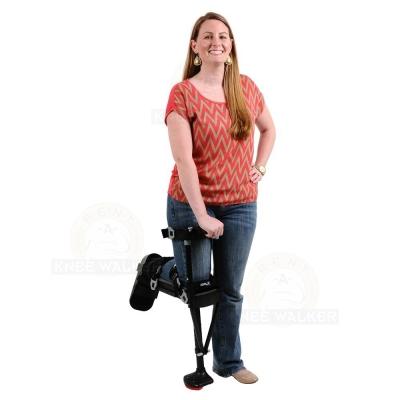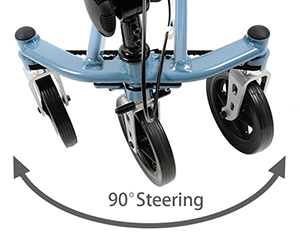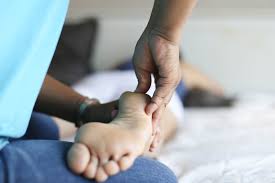-
Foot Surgery Recovery Tips
- The day has finally come after considering all your options including non-invasive and surgical options, you have no choice but to go through with a foot surgery. Depending on the type of surgery this could mean weeks of being non-weight bearing on one of the most crucial parts of the body. When you wake up from the surgery the real hard work begins. Rehabilitation is a strong powerful word which can sound dreadful at the time, but we have some tips which will help the recovery process.
Power of Positivity In a trident world full of negative and often cynical stories there may be no better time for the power of positivity. The benefits of having all extremities working together in unison is often taken for granted. When that capability is taken from us there can be a sense of moral discomfort. Simple everyday tasks such as taking a shower in the morning, going to the lavatory, walking downstairs and the always frustrating inability to drive a car can demoralize a person. Therefore, having such positivity around you is very substantial.
In a trident world full of negative and often cynical stories there may be no better time for the power of positivity. The benefits of having all extremities working together in unison is often taken for granted. When that capability is taken from us there can be a sense of moral discomfort. Simple everyday tasks such as taking a shower in the morning, going to the lavatory, walking downstairs and the always frustrating inability to drive a car can demoralize a person. Therefore, having such positivity around you is very substantial.
By focusing on how you will benefit from your surgery it will give you added motivation to return healthier than before. If you focus to much on the hindrances which come with the recovery process rather than the positives of the corrective action it can affect your emotional state thereby leading to self-doubting making it tougher to get past the recovery. The way to combat this is to say that you accept your situation. Surround yourself with friends and family, this can be the best answer when you take on a daunting task of rehabilitation. If a family member or friend went through a comparable situation, they can motivate you and encourage you with the power of positivity to get you going in the right direction.
Find what works best for you
Between countless doctors’ visits and information you may read about online, it can be a difficult to decide what may work best. At the end of the day, only you can make that decision. For some individuals they find knee walkers work best and for others it could be ergonomic crutches or the iWALK2.0, just to name a few, but regardless of what you choose, being comfortable matters. I can’t tell you how important this is. When I had my injury, I was on crutches for almost 2 years. In this time, I began to feel uncomfortable in my recovery.
It got to a point during physical therapy that I ended up stopping as soon as I felt “alright” enough. Feeling alright enough is not a good option to stop doing physical therapy. I wanted desperately to get off crutches due to the uncomfortable nature of them. In doing so I ended physical therapy too early and didn’t give myself enough time to recover. If I had the knowledge of this article when the decision came to stop physical therapy, I would have absolutely tried a different method. I didn’t have the knowledge that alternative options existed out there such as the Swivelmate Knee Walker a highly maneuverable 90-degree steering knee walker that would have changed my life during this recovery process.
Among other options such as the Orthomate knee walker or Ergonomic Crutches, those options would have provided a much better situation then ending physical therapy early and jeopardizing additional injury. Therefore, it’s imperative to figure out which decisions are going to work out for you. Each person needs to figure out a game plan with his/her doctor. Don’t fear trying out new choices for recovery. If you are uncomfortable then always know there are alternative options out there that can make life much easier for you.
Acknowledge that the pain is inevitable during recovery
No matter who the person is we all have a different pain tolerance level. I did not anticipate how much my injury would hurt and I am not sugarcoating anything when I say it is not a pleasant experience and I would not wish an injury on anyone. Having said that, each part of our body has different amounts of nerve endings. This is especially true because I blacked out after suffering a gruesome injury on the football field.
While I could never have anticipated the long road of recovery in front of me, the pain was agonizing. After the surgery I had to accept that pain was going to be a part of the recovery process. By moving my injury little by little, movement began to return and the gradual process of recovery began. The saying is “no pain no gain”, so I had to acknowledge the boundaries my body would allow until the pain began to diminish. By acknowledging your situation and pain it will aid you in being highly vigilant of your surroundings as you begin the recovery process.
Each person recovers at their own pace (Don’t compare yourself to others)
Regardless of the injury each person recovers at their own pace. It is highly unwise to compare yourself to others who may be going through something similar. Your body will only recover as quickly as it will allow. Someone who may be recovering quickly may not have a medical condition you had, the surgery may not have been as extensive, etc. T he recovery time that the doctors estimate may be a certain number of weeks but if the recovery time is taking longer than expected the most important thing is not to get discouraged. Sure, it may take an estimated 6-8 weeks but if it’s looking more like 10 – 12 weeks this comes back to accepting the situation you are in.
he recovery time that the doctors estimate may be a certain number of weeks but if the recovery time is taking longer than expected the most important thing is not to get discouraged. Sure, it may take an estimated 6-8 weeks but if it’s looking more like 10 – 12 weeks this comes back to accepting the situation you are in.
Not everyone will be recovering at the same pace. I know from experience it’s easy to want to compete with the person next to you and see if you can squat a little lower or bend the knee a little further, but this is unwise. Remember the power of positivity, even if you were able to gain a centimeter over the previous week that’s improvement. Use every small gain as motivation and you will see a large difference in your attitude and outlook of the situation. I can’t stress this enough “Focus on your own recovery” this is one of the most important lessons I learned during my recovery experience. It’s your health at stake not a competition to recover the quickest. Only do as much as your body will physically allow, slow and steady wins the recovery race.
Traveling after foot surgery
Right after the surgery travel will be difficult due to the inconveniences that come with gallivanting while trying to recover. For my injury it was impossible to bend my extremity for almost 4 to 6 weeks after my surgery so when we would go somewhere lengthy, I would always ask for a wheelchair if possible and it was very important to know where handicap accessible restrooms were. It’s important when going on long trips such as an extended time on a plane, bus or car to get some movement in the afflicted area and stretch whenever possible. The stiffer the joint gets the worse you will feel so try and get the blood flowing whenever possible. Depending on the lower leg injury you may or may not be able to bend the extremity so getting extra leg room always helps.
Make sure that you call managers ahead of time so that any event organizers can prepare for your arrival. During any events you attend this can aid in speeding up the process of being seated and not being rushed. If you are rushed that’s when mistakes can happen, and they can be painful especially if you move the wrong way or bump your area of incision on anything. Be it boarding a cruise ship, plane, car or attending an event giving yourself extra time and notifying coordinators of your limitations will give you slightly more comfort.
Have some patience
This is one of the most important parts of the recovery process. In my situation I ended up spending a lot more time then originally thought just trying to get movement back. No matter if it’s a leg injury, knee injury or foot injury the recovery time will only move as fast as your body will allow it. Was I frustrated at first? Yes of course I was! Who wouldn’t be frustrated! I couldn’t do anything I had the ability to do a few weeks earlier. The best way that I recommend dealing with a recovery process is that it’s a marathon not a sprint.
The recovery process is a very tedious and delicate process. It takes more then just doing exercises it takes will power. Having a strong self determination allows you to do the what you may perceive as impossible but will become possible when you put your mind to it.
Ask questions Finally ask questions if you think that something in your recovery doesn’t seem like it feels right don’t hesitate to give a call to your doctor’s office. I didn’t feel like my recovery was progressing at all how the doctors thought it was. Unfortunately, the procedure was done incorrectly, and a correction surgery was needed for me which was even more rigorous than the initial surgery. Talk about a gut punch!
Finally ask questions if you think that something in your recovery doesn’t seem like it feels right don’t hesitate to give a call to your doctor’s office. I didn’t feel like my recovery was progressing at all how the doctors thought it was. Unfortunately, the procedure was done incorrectly, and a correction surgery was needed for me which was even more rigorous than the initial surgery. Talk about a gut punch!
That’s why it’s important to ask questions because you should be increasing the level in which you are able to be active. If your physical therapists are pushing, you too hard speak up and tell them. The therapist can’t feel your pain so it’s incredibly important to ask them questions if you’re feeling anything abnormal. Above anything else be sure to know the exact restrictions that have been given to you post op. The restrictions are there to prevent any further injury so don’t be afraid to speak up.
We hope that your recovery process goes smoothly!
More Great Rent A Knee Walker News & Stories
- •Keeping Mentally Fit After Your Foot or Ankle Injury
- •
- •Top 10 Reasons Why We Hate Crutches

